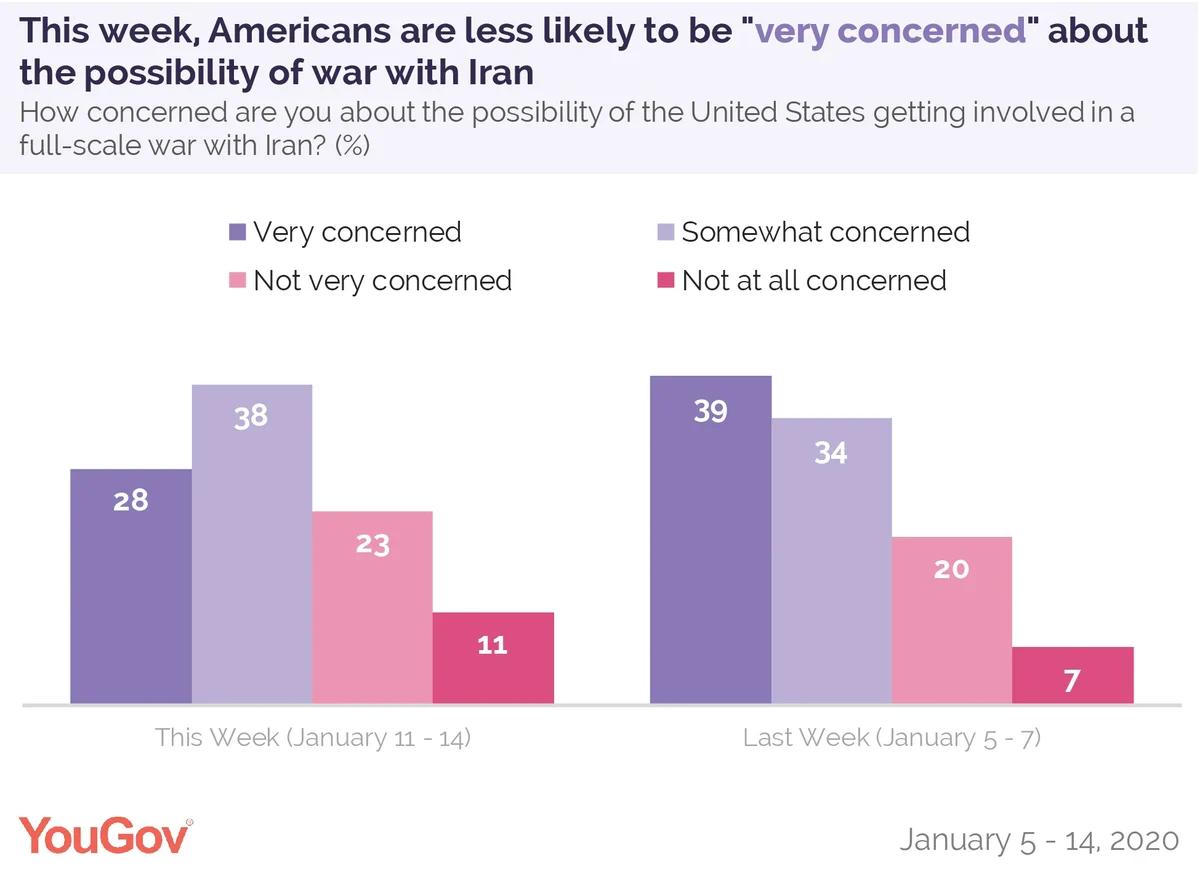Over the last week, tensions with Iran appear to have eased. A relative calm has descended despite the Iranian retaliation for the American killing of General Qassim Suleimani and the imposition of additional US sanctions. Americans in the latest Economist/YouGov Poll are less worried about war with Iran, and less concerned that President Donald Trump will lead the country into war.
Last week, the public was worried. But the share of the country that thinks it is very likely the situation with Iran will escalate into a wider conflict has dropped 12 points in the last week; the percentage who say they are very concerned about the possibility of that war occurring has dropped 11 points.

Both worries rose last week; they are now back to where they were before the US killing of Iranian General Qassim Suleimani. The drop in concern, just as its rise last week, comes mostly from Democrats and Independents. Republican opinion has changed little over this time.
The movement may have more to do with Iran’s admission that it accidentally shot down a Ukrainian airliner than with actions of the Administration, which a plurality of Americans (43%) say they have heard “a lot” about. Republicans and Democrats are equally likely to say they have heard “a lot” or “a little” about the event.
Fewer people this week than last week think Trump is very likely to get the United States into a war, dropping six points since last week (30% to 24%). Fewer call the killing of Suleimani an act of war than did so last week (41% of Americans this week say it was an act of war; last week 46% did).
Trump appears to be benefiting from the deescalated tensions with Iran. The step back by both countries from additional military actions after the Iranian retaliatory actions against US bases (with no casualties) is also something Americans of both parties like. A majority of Americans overall (64%), as well as Republicans (72%) and Democrats (64%), approve of the US not engaging in further military action in response to Iran’s rocket attack.
The public still prefers avoiding war with Iran over confronting it, and that underlying belief has been stable: this week, 44% say it is more important to avoid war; 35% say they prefer confronting Iranian aggression – not statistically different from the 46% to 36% split last week.
Some opinions of the president have changed little: Americans continue to be concerned about the president's abilities in foreign policy. Nearly two in five (39%) say they are confident in his ability to handle an international crisis, about half (48%) are uneasy. Those figures still are only slightly better than last week (36% confident and 51% uneasy).
The president’s approval rating is somewhat better than usual but is still under water: 44% approve of how President Trump is handling his job, while 48% do not. That evaluation may not just be because of the reduction of tension with Iran. He also is benefiting from stronger support on the economy (50% approve of his handling of the economy, one of the highest ratings on this issue during his presidency).
The positive economic evaluation and the lessening of tensions with Iran may have had an ancillary effect. When Americans look at the House votes on the Articles of Impeachment against the president and the expected Senate trial, they are very closely divided. Last week, Americans supported impeachment, though they were divided on removal by the Senate. Independents now clearly oppose the impeachment votes and removal from office.
On the other hand, there is support for the Senate to call witnesses in any upcoming trial.
- By 45% to 17% (including one in four Republicans), Americans want to hear from John Bolton, the former National Security Adviser
- By 37% to 31% (including one in three Democrats), they want to hear from Hunter Biden
- By 51% to 18%, they want even more witnesses
And Americans still worry that the Senate trial won’t be fair. 44% (including a third of Republicans) believe that. Only three in ten (30%) overall do not.
See the full toplines and crosstabs from this week’s Economist/YouGov poll
Image: Getty










